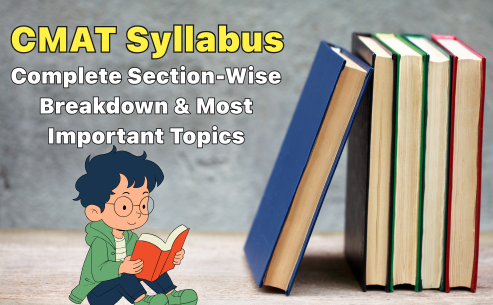The Common Management Admission Test (CMAT) is still one of the most vital MBA entrance tests in India. Learning about the CMAT 2026 syllabus should be the essential step towards your preparation and scoring. The CMAT 2026 syllabus has five key areas and mastering CMAT section wise topics is crucial to the aspirants. The following guide contains the entire CMAT 2026 syllabus breakdown, with this information you will now be able to organize your preparation approach and focus on all the most important areas that are most often tested in the exam.
CMAT 2026 Overview
The CMAT 2026 syllabus is based on a written pattern in which the postulants are tested on a variety of competency zones. The CMAT section wise topics are the following; Quantitative Techniques and data interpretation, logical thinking, understanding language, current affairs, and creativity and entrepreneurship. Learning the CMAT 2026 syllabus design is important when making a proper study strategy.
Section-Wise Break-Up of CMAT Test Pattern 2026
The CMAT 2026 exam pattern consists of 100 objective-type questions equally distributed across five sections. Each section in the CMAT 2026 syllabus carries equal weightage with specific marking schemes.
| Exam Component | Details |
| Total Questions | 100 MCQs |
| Questions per Section | 20 |
| Total Sections | 5 |
| Marking Scheme | +4 for correct, -1 for incorrect |
| Duration | 3 hours (180 minutes) |
| Mode | Computer-based Test (CBT) |
| Section in CMAT 2026 | Quantitative Techniques & Data Interpretation Logical Reasoning Language Comprehension General Awareness Innovation & Entrepreneurship |
| Inclusion of TITA Questions | No |
CMAT Syllabus 2026: Sectional Weightage, Topics, Section-Wise Syllabus Breakdown
CMAT Paper Pattern 2026: Sectional Distribution of Marks
| CMAT Sections | No of Questions | Marks per Question | Maximum Marks Allotted |
| Quantitative Techniques & Data Interpretation | 20 | 4 | 80 |
| Logical Reasoning | 20 | 4 | 80 |
| Language Comprehension | 20 | 4 | 80 |
| General Awareness | 20 | 4 | 80 |
| Innovation & Entrepreneurship | 20 | 4 | 80 |
| Total | 100 | 400 |
CMAT Marking Scheme 2026
| Particulars | CMAT Marking Scheme |
| Correct Answer | +4 |
| Incorrect Answer | -1 |
| Unanswered Questions | 0 |
CMAT Syllabus 2026 for Quantitative Techniques & Data Interpretation
The CMAT quantitative aptitude syllabus forms the mathematical foundation of the exam. Key CMAT quantitative aptitude syllabus topics include:
Core Topics:
- Arithmetic (High Priority): Percentages, Profit & Loss, Simple & Compound Interest, Time & Work, Time & Distance, Ratio & Proportion
- Algebra: Linear Equations, Quadratic Equations, Progressions, Logarithms
- Geometry: Triangles, Circles, Mensuration, Coordinate Geometry
- Data Interpretation: Tables, Bar Graphs, Pie Charts, Line Graphs, Mixed Charts
- Number System: Prime Numbers, HCF & LCM, Divisibility Rules
- Probability & Statistics: Basic probability, Mean, Median, Mode
Preparation Tips: Focus on speed and accuracy as the CMAT quantitative aptitude syllabus demands quick calculations and time management skills.
CMAT Syllabus 2026 for Logical Reasoning
The CMAT logical reasoning syllabus tests both verbal and non-verbal reasoning abilities across diverse question types.
Key CMAT logical reasoning syllabus Topics:
- Verbal Reasoning: Critical Reasoning, Statement-Conclusion, Statement-Assumption, Cause & Effect
- Non-Verbal Reasoning: Series Completion, Coding-Decoding, Blood Relations, Direction Sense
- Analytical Reasoning: Seating Arrangements, Puzzles, Syllogisms
- Pattern Recognition: Number Series, Letter Series, Figure Series
- Data Sufficiency: Information adequacy assessment
Difficulty Assessment:
- High: Complex analytical puzzles in CMAT logical reasoning syllabus
- Moderate: Basic reasoning and series completion
- Easy: Simple coding-decoding patterns
CMAT Syllabus 2026 for Language Comprehension
In the CMAT Language Comprehension section, Reading Comprehension and English usage questions are asked. There are 3-4 Reading Comprehension passages in CMAT, which are easily understandable. These are 500-600 words in length, and fetched from management, economics, and related areas.
The CMAT language comprehension topics focus on reading skills and English language proficiency essential for management studies.
Major CMAT language comprehension topics:
- Reading Comprehension: Business passages, Economic topics, Management concepts
- Vocabulary: Synonyms, Antonyms, Word meanings, Analogies
- Grammar: Sentence Correction, Fill in blanks, Error Detection
- Verbal Ability: Para jumbles, Sentence completion, One word substitution
Question Formats: The CMAT language comprehension topics include multiple-choice questions based on passage comprehension and direct vocabulary assessments.
CMAT Syllabus 2026 for General Awareness
The CMAT gk syllabus evaluates candidates’ knowledge of current affairs and static general knowledge with business focus.
Focus Areas in CMAT gk syllabus:
- Current Affairs (60% weightage): National/International news, Economic developments, Business updates
- Static GK (40% weightage): Geography, History, Polity, Economics, Science
- Business & Economy: Stock markets, Banking, Insurance, Government schemes
- Books & Authors: Famous personalities, Award winners
- Science & Technology: Recent innovations, Space missions
Preparation Approach: Regular newspaper reading and monthly current affairs compilations are essential for mastering the CMAT gk syllabus.
CMAT Syllabus 2026 for Innovation and Entrepreneurship
This section in the CMAT 2026 syllabus assesses entrepreneurial knowledge and innovative business practices.
Topics Covered:
- Entrepreneurship fundamentals and concepts
- Innovation in business models
- Start-up ecosystem understanding
- Corporate social responsibility
- Digital transformation trends
Most Important Topics for CMAT 2026
Based on analysis of previous year patterns and expert recommendations, here are the high-priority topics for each section for CMAT 2026 syllabus:
| Section | High Priority Topics | Preparation Focus |
| Quantitative Techniques | Percentages, Profit & Loss, Data Interpretation, Time & Work | Practice speed solving, focus on shortcuts |
| Logical Reasoning | Coding-Decoding, Series, Blood Relations, Puzzles | Regular practice of different question types,Pattern recognition |
| Language Comprehension | Reading Comprehension, Vocabulary, Grammar | Improve reading speed, build vocabulary |
| General Awareness | Current Affairs (6 months), Business News, Banking | Daily newspaper reading, monthly compilations |
| Innovation & Entrepreneurship | Entrepreneurship basics, Start-up ecosystem | Focus on contemporary business trends |
Weightage Distribution:
- Reading Comprehension and Data Interpretation typically carry higher weightage
- Current affairs questions often dominate the GK section
- Arithmetic topics are frequently tested in Quantitative section
CMAT 2026 Preparation Strategy– Section-wise Time Allocation, Resource Recommendations
Time Distribution for CMAT 2026 syllabus:
- Quantitative: 30% study time – Master CMAT quantitative aptitude syllabus formulas
- Logical Reasoning: 25% study time – Practice CMAT logical reasoning syllabus patterns
- Language: 20% study time – Focus on CMAT language comprehension topics
- General Awareness: 20% study time – Cover CMAT gk syllabus systematically
- Innovation: 5% study time – Business trends and entrepreneurship
Resource Recommendations:
- Standard MBA books for CMAT section wise topics
- Business newspapers for CMAT gk syllabus preparation
- Online mock tests covering complete CMAT 2026 syllabus
- Previous year papers for CMAT section wise topics practice
Frequently Asked Questions
1. What are the sections in CMAT 2026?
The CMAT 2026 syllabus includes five sections covering CMAT section wise topics: Quantitative Techniques, Logical Reasoning, Language Comprehension, General Awareness, and Innovation & Entrepreneurship.
2. What topics are covered in General Awareness?
The CMAT gk syllabus covers current affairs (national/international), static GK, business news, economics, sports, awards, and science & technology developments.
3. What are important topics for Quantitative Techniques?
Key CMAT quantitative aptitude syllabus topics include Arithmetic, Algebra, Geometry, Data Interpretation, and Statistics.
4. Is the Innovation & Entrepreneurship section mandatory?
Yes, Innovation & Entrepreneurship is part of the exam structure with 20 questions, making it mandatory for all candidates.
5. What is the weightage of each CMAT section?
Each section carries equal weightage with 20 questions each, contributing to a total of 100 questions worth 400 marks.
6. Has the CMAT syllabus changed for 2026?
The core CMAT 2026 syllabus structure remains consistent with previous years, maintaining the five-section format with similar topic coverage.
7. How should I prepare for the GK section?
Focus on current affairs from the last 6 months, read business newspapers daily, and prepare monthly current affairs compilations along with static GK topics.
8. Which section in CMAT 2026 syllabus is most challenging?
The CMAT logical reasoning syllabus is generally considered challenging due to complex analytical puzzles, though difficulty varies based on individual strengths and preparation levels.
Conclusion
The CMAT 2026 syllabus provides a comprehensive framework for management aptitude evaluation. Success requires mastering all CMAT section wise topics including the CMAT quantitative aptitude syllabus, CMAT logical reasoning syllabus, CMAT language comprehension topics, and CMAT gk syllabus. Focus on high-priority areas within each section of the CMAT 2026 syllabus while maintaining consistent preparation across all topics. Regular practice of CMAT section wise topics and staying updated with current events will maximize your CMAT 2026 success potential.
Ready to master the CMAT 2026 syllabus? Start your comprehensive preparation covering all CMAT section wise topics today!







